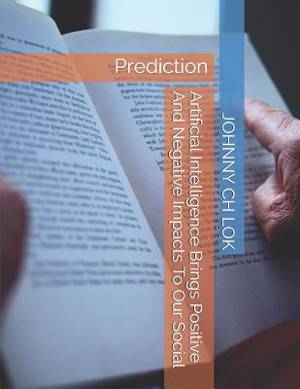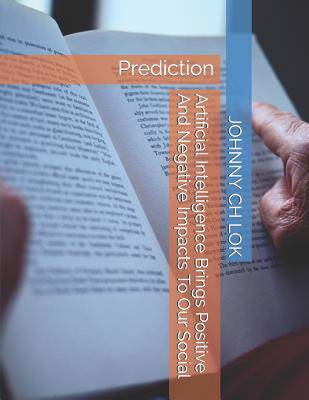
Door een staking bij bpost kan je online bestelling op dit moment iets langer onderweg zijn dan voorzien. Dringend iets nodig? Onze winkels ontvangen jou met open armen!
- Afhalen na 1 uur in een winkel met voorraad
- Gratis thuislevering in België vanaf € 30
- Ruim aanbod met 7 miljoen producten
Door een staking bij bpost kan je online bestelling op dit moment iets langer onderweg zijn dan voorzien. Dringend iets nodig? Onze winkels ontvangen jou met open armen!
- Afhalen na 1 uur in een winkel met voorraad
- Gratis thuislevering in België vanaf € 30
- Ruim aanbod met 7 miljoen producten
Zoeken
€ 27,95
+ 55 punten
Omschrijving
Chapter TwoHow robot (AI) brings positive impact on socio/economic/cultural benefits to influence our lifeOn socio/economic/cultural micro economic beneficial aspect, artificial intelligent (AI) technology or robot will be one technological tool to impact our future life. Such as saving our lives time to online shopping predictions and raising crop productivity. That is not an exaggeration. AI can already help doctors to identify cancers and other diseases, thereby prolonging human life. In the future, it could be used to predict and locate earthquakes, businesses can apply it to detect transactions fraud.On macro economic beneficial aspect, (AI) stands to benefit society as a whole, across all sectors. For example, going about their everyday lives as much as for business. That also applied to government and public administrations. It identifies some main areas where (AI) can help in health, education and judiciary systems. In public employment and security aspects, for example, (AI) technologies can sense both people and business to raise the efficiency of public services as well as user satisfaction.Also, much of what (AI) can achieve public administration promotion of e-government and digitized public service as part of building the digital single market benefits, such as: saving time and public money, providing better public services, joining them up across borders, raising efficiency and improving transparency, bringing people closed to their governments; involving them more in decision making.On cultural influential aspect, (AI) will bring human a new common culture for the innovation of public services. Artificial intelligence will redesign own lives. Our daily lives of human beings, citizens, whereas parents and children are changing before everyone's life attitude. Indeed, we can be sure that our customs will soon be reshaped consequently social changes that requires an individual and collective reflection and in some cases. (AI) technologies in the public sector is the definition of shared opinions to solve all the challenges that we will face in societies.It brings this question: Why does public administration need (AI) tool assist? Due to (AI) can assist public administration to improve services to citizen and businesses, thus giving a decisive impulse to innovation, the proper functioning of the economy and more generally to progress in daily life.For example, today artificial intelligent robots can drive our vehicles, take care of elderly or sick people, perform dangerous jobs and help us make informed decisions based on the rational management of large amount of data. Also, it can enable us to communicate in languages. We don't know, help us study and increase the cultural or entertainment experiences at our disposal. In the public administration influential aspect, it can be used profitably in the healthcare, education, and judiciary system, public employment, security and more generally in the management of relations with citizens, which can be simplified and at the same time be more effective, quick and efficient.How can be (AI) anticipated to attribute its ability to assist public administration service innovation? Such as the use of chat bots to answer citizens' questions, help them to find information, they need and cut through layers of bureaucracy or the use of robots to take care of the sick, algorithms that need the results of medical exams, those that help students improve their performance. Moreover, attention's given to monitor and manage careers, those for the surveillance of public places to the recognition of network threats, tools for the rational management of problems generated by natural disasters and many others. In order to successfully implement these technologies. It is necessary to evaluate the different challenges that must be faced to integrate (AI) in a profitable way.
Specificaties
Betrokkenen
- Auteur(s):
- Uitgeverij:
Inhoud
- Aantal bladzijden:
- 54
- Taal:
- Engels
- Reeks:
Eigenschappen
- Productcode (EAN):
- 9781799116318
- Verschijningsdatum:
- 8/03/2019
- Uitvoering:
- Paperback
- Formaat:
- Trade paperback (VS)
- Afmetingen:
- 216 mm x 279 mm
- Gewicht:
- 195 g

Alleen bij Standaard Boekhandel
+ 55 punten op je klantenkaart van Standaard Boekhandel
Beoordelingen
We publiceren alleen reviews die voldoen aan de voorwaarden voor reviews. Bekijk onze voorwaarden voor reviews.











